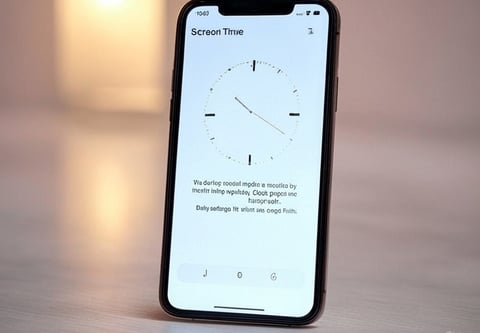The Algorithm War: How They Influence Your Mind Without You Noticing
The algorithm war influences your mind without you even noticing — check out tips on how to protect yourself from its effects on your life!
The Algorithm War: How They Influence Your Mind Without You Noticing


Every Time You Pick Up Your Phone, Something's Deciding What You See on the Screen. I have, and honestly, it leaves me a little intrigued! Today, algorithms — those smart systems that choose what pops up on your feed — are everywhere, from TikTok to YouTube, and they hold a lot of power.
The "algorithm wars" are real, and what’s even more shocking is how much they shape the way we think without us even realizing it. They decide what you see, what you get interested in, and even what you believe to be true! Today, I want to chat with you — just like we were sitting on a park bench — about what's really going on behind the scenes and how you can protect yourself.
Shall we talk?
What Is This "Algorithm War" Anyway?
First, let me explain what I mean by "algorithm war."
You know when you open TikTok and suddenly a video pops up that feels like it was made just for you? Or when you're on YouTube and the video suggestions are exactly what you were searching for?
That’s not a coincidence — that’s algorithms at work!
Algorithms are like a digital brain that watches everything you do online: the videos you watch, the posts you like, even how long you stare at a photo.
Based on that, they decide what to show you next.
But why do I call it a "war"?
Because companies behind these platforms — like TikTok, Google, and Meta — are fighting to keep you connected for as long as possible.
A 2023 Nielsen study showed that people spend an average of 3 hours and 15 minutes per day on social media.
The longer you stay, the more money they make from ads.
And algorithms are the secret weapon in this battle: they keep showing you things that hook you — even if it’s not always good for your mental health.
How Do Algorithms Change the Way You Think?
Now, let me tell you how these algorithms mess with your mind — and honestly, it's a little chilling!
I've been through it without even realizing it, and I bet you’ll see yourself in some of these examples too.
They Trap You in an Invisible Bubble
Have you ever felt like your feed was tailor-made just for you?
That’s not by chance! Algorithms create an invisible bubble — a personalized world based only on what you already like or watch.
For example, if you enjoy recipe videos, YouTube will mostly suggest more recipes — and almost nothing outside that topic.
A 2021 study from Oxford University found that 62% of social media users end up seeing only content that confirms what they already believe, because algorithms think it will keep you online longer.
I've noticed it on my own phone: if I watch one political video, suddenly my feed floods with more political content, blocking out other perspectives.
They Make You Believe Only One Side of the Story
Because of this bubble, algorithms can push you into believing that only one side of a story exists.
If you engage with posts supporting a certain idea — like "this diet is the best" — the algorithm will show you more content agreeing with that idea, and almost nothing that challenges it.
A 2022 study by the American Psychological Association showed that this makes people more closed off to other opinions because they rarely see different ideas.
I saw it happen with a friend: she started following profiles with just one way of thinking, and over time, it felt like she couldn’t accept any other perspective.
It was like the algorithm "locked" her into a single point of view!
They Play with Your Emotions
One thing that really worries me is how algorithms mess with your feelings.
They're designed to keep you glued to the screen, so they often show content that makes you curious, angry, or scared — because those emotions make you click more.
An article from Harvard Business Review in 2020 said that emotional content (especially anger or curiosity) is 34% more likely to go viral.
I've fallen into this trap so many times: I once saw a video that made me super mad about some news story, and I kept clicking on more and more related videos.
By the time I realized it, hours had passed — and I felt miserable!
How Does This Affect Your Life Without You Even Realizing It?
Think about it: how does this "algorithm war" affect your life, both daily and long-term?
I’m amazed at how much it can change us without us even noticing.
It Can Make You More Anxious
One thing I really notice is how it increases anxiety.
When algorithms show you mostly stressful things — like bad news or posts that make you compare yourself to others — it weighs on your mind.
A 2022 study from the University of Sussex found that 58% of people who spend more than two hours per day on social media report feeling more anxious because of the content they consume.
I’ve felt this myself: there were days when my feed was full of heavy news stories, and I ended up feeling super down without even knowing why.
It Steals Your Time and Focus
Another problem: algorithms make you waste a ton of time.
You know when you open YouTube for a quick video — and next thing you know, an hour’s gone by?
A study from the University of California showed that after getting distracted, it can take up to 23 minutes to fully refocus on what you were doing.
I’ve lived this so many times: once, I opened YouTube for a makeup tutorial and ended up watching random videos for hours.
By the end of the day, I had barely done half of what I needed to!
It Can Shift What You Believe Over Time
Long term, algorithms can even change what you believe is true.
Because they keep showing you just one version of reality, you can start thinking, "this is just how the world is."
A 2023 study from the University of Cambridge found that people exposed only to personalized content are 40% more likely to shift their political or social opinions without realizing it.
I saw it happen with my uncle: he started watching specific health-related videos, and now he believes anything outside of his feed is "fake news."
It’s pretty scary when you think about it!
How Can You Protect Yourself and Take Back Control?
Now, the part I love the most: how we can protect ourselves from this "algorithm war" and take back some control over what enters our minds.
I’ve tried a few things and researched expert advice. Here’s what’s been working for me!
Seek Out Different Content
The first thing I did was try to "break" the bubble.
I started actively searching for content I normally wouldn't see — following accounts with different views or watching videos about topics I knew little about.
Tech expert Dr. Ethan Zuckerman from MIT says that seeking out new content online can help you see the world more broadly.
For me, it’s been amazing: I followed an astronomy account (something I never thought about before!) and now I'm learning so many new things.
Set Time Limits for Social Media
Another thing that helped a lot: limiting my time online.
The more time I spent scrolling, the more trapped I felt.
So, I made a rule: 1 hour a day — and that’s it!
A study from the University of Sussex showed that cutting back on screen time can reduce anxiety by up to 20%.
For me, it's been a huge change — now I have more time to do things that genuinely make me happy, like cooking or walking in the park.
Use Tools to Control What You See
There are also tools that can help you take back control.
For example, I use a browser extension called Privacy Badger, which blocks trackers that algorithms use to monitor you.
On YouTube, you can click "Don’t recommend this video" to teach the algorithm what you don't want to see.
A Carnegie Mellon University study showed that having more control over your feed can lower stress and boost focus.
And for me, it’s been such a relief!
Can This Really Change Your Life?
Now, imagine: what if you could control more of what enters your mind?
I’ve already felt the difference in my life, and I believe you can too.
When we protect ourselves from algorithms, we feel lighter, less anxious, and more open to new ideas.
You’ll have less stress, more time for things you love, and a broader view of the world.
Of course, we can’t completely escape algorithms — they’re everywhere!
But with these tips, you can at least decide more about what they show you.
It’s like building a shield to protect your mind.
You Have the Power to Choose What Enters Your Mind
So, what did you think of our chat?
The "algorithm war" is happening all the time, and it shapes what we think without us noticing — creating bubbles, reinforcing our ideas, and playing with our emotions.
But the good news is: you can protect yourself.
You can break the bubble by seeking new content, limit your time online, and use tools to control your feed.
Why not start today? Pick one of these tips and try it for just one day.
Little by little, you’ll feel your mind getting lighter — and your life becoming truly yours again.
You deserve to have the power to decide what influences you.
And I’m cheering for you!
